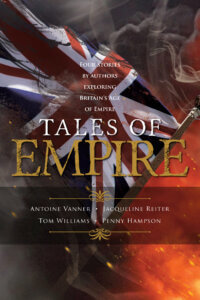
by TCW | Dec 20, 2024 | Uncategorized
This time next week Christmas will have come and gone, though our celebrations, like many other people’s, will still be in full flow. This will be my last blog post of the year so I wish you all a really lovely Christmas and I will see you in 2025.
My Christmas picture (above) shows the decorations in Seven Dials. They are really pretty. I posted this picture last month together with a bit of history about the sundial that all the lights are arranged around. You can read about it HERE.
At this time of year, writers often like to include something from one of their books that references Christmas. That’s always a problem for me. My characters are usually away from England at Christmas time and are often quite busy fighting wars. Christmas hardly features. There’s more than usual about Christmas in my current WIP, Burke and the War of 1812, but, even so, it barely rates a mention. Burke has gone off to do something important somewhere comfortable, leaving poor William Brown, who often gets left doing the hard work, to spend winter living with the Shawnee tribe in a camp in what is now Indiana. Here’s his experience of Christmas.
Christmas came and went. William wasn’t sure of the day but he taught the Shawnee some carol tunes which they sang with their own words. William didn’t understand what they were singing and thought he would be happier not knowing, but the tunes provided some comfort as the shortest day came and went and the weather grew colder.
I hope your Christmas is more fun than his.
I’m always impressed by people who turn out short stories at the drop of a hat. I did do a special Christmas short story last year but I’m not going to manage this feat twice. Last year’s story was not historical but features Galbraith and Pole, the main characters in my Urban Fantasy series. It’s set soon after the two of them meet (in Something Wicked) and it’s an unashamedly sentimental tale of Christmas Eve. If you haven’t already read it, it’s still available HERE.
That’s all for this week, this Christmas and this year. I wish you all the best for the holidays and hope people give you lots of books.
by TCW | Dec 13, 2024 | Uncategorized
I’ve been using my blog recently to suggest that you might like to consider buying some of my books as Xmas gifts. This week, I thought I’d take the opportunity to feature some other historical novelists whose books you might enjoy.
Penny Hampson
Penny is one of the contributors to Tales of Empire which features four short stories by different writers, including me. At just £2.99 in paperback, it is a stocking filler at a stocking filler price.
Penny writes (amongst other things) Regency novels with a strong romantic element. She’s chosen to feature her latest, An Adventurer’s Contract.
A man on the hunt for a traitor. A woman in search of the truth.
Gabrielle Mercer is in trouble. Her cousin is missing, her father’s death looks like murder, and now there are rumours she is spying for the French. With no one to turn to, dare she accept help from a man she doesn’t like?
Jack Ashdown is on a mission to unmask a ruthless spy. Could it be the reclusive young Frenchwoman who has made no secret of her contempt for Englishmen like himself? Perhaps Gabrielle’s predicament will be the perfect opportunity to win her trust and do some spying of his own.
Getting close to one’s enemy is a dangerous option, but the stakes for Jack and Gabrielle are too high to ignore. Will their gamble to trust one another lead to disaster, or will they discover that neither of them is what they seem?
You can buy An Adventurer’s Contract at https://mybook.to/AnAdventurersContract
Deborah Swift
I’m in awe of Deborah Swift whose books range from the Civil War to World War II. She’s chosen to feature one of my favourites, The Poison Keeper.
Discover the story of Giulia Tofana, Renaissance poisoner. When Giulia’s mother is accused of attempting to poison the Duke de Verdi, Giulia must go on the run. She goes to her Aunt Isabetta, a courtesan, but the Duke has his spies, and will not let her go so easily.
BookViral Gold Medal Winner and Wishing Shelf Book of the Decade.
Universal link http://mybook.to/PoisonKeeper
Jennifer Ash
Jennifer Ash is one of the pseudonyms of Jenny Kane, who uses different names to differentiate her books in different genres. Her Jennifer Ash persona is my favourite. Behind the plot line of her Folville Chronicle series sits a huge amount of historical research she did over twenty-five years ago when she studied for a PhD in fourteenth century English crime.
The Folville Chronicles is a set of four novels (The Outlaw’s Ransom, The Winter Outlaw, Edward’s Outlaw and Outlaw Justice). This fourteenth-century, historical crime, series features Mathilda of Twyford, a 19 year old potter’s daughter, who suddenly finds herself a prisoner in the Folville brother’s manor in Ashby-Folville, Leicestershire.
This series of murder-mysteries are set in the winter months, with book two, The Winter Outlaw, featuring the Christmas period – but before Mathilda and the brothers can celebrate, they need to find out just who the winter outlaw is…
The Folville Chronicles (4 book series) Paperback edition
Lynn Bryant
Lynn writes the hugely popular Peninsular War Saga, following the adventures of a fictional Light Division brigade fighting under Wellington as the French are driven out of Spain. The brigade might be fictional but the details of the military history are painstakingly accurate and she provides a brilliantly clear picture of the campaign. Personally I prefer the naval adventures in her less well known Manxman books. I raved about the first in the series, An Unwilling Alliance, when it first came out (my review is HERE). It centres on the British attack on Copenhagen in 1807 and I can wholeheartedly recommend it.
You can buy the paperback HERE.
Antoine Vanner
Antoine Vanner’s novels, about naval warfare in the early days of steam, follow the adventures of the fictional Nicholas Dawlish as he rises up the ranks in battles in locations from Denmark, Turkey, Paraguay and the United States to Cuba, Korea, Britain, East Africa and the Sudan. This year is his first venture into non-fiction, with a book about naval exploits in the age of sail. Broadside and Boarding is a collection of some eighty stories, ideal for coffee breaks, or whenever you want a short but fascinating read. Buy it now in paperback and get it in time for Christmas. https://www.amazon.co.uk/Broadside-Boarding-Small-action-Fighting/dp/1943404550.

by TCW | Dec 6, 2024 | Uncategorized
They say that if you want to make God laugh, you should tell him your plans. I had some vague plans about using November blog posts to try to sell the odd book. Even with my attempts to cut back on blogging, I still post something almost every week and most of them are remarkably unconnected to the business of getting you to buy the stuff I write. So November should be nose-to-tail selling posts. Then I suddenly got my spot on the NHS waiting list to get a new elbow (details HERE if you’re interested) and my selling blogs skidded to an unscheduled stop.
So here we are in December and I hope that I still have time to encourage you to buy a friend one of my Galbraith & Pole books for Christmas.
Galbraith & Pole is my foray into Urban Fantasy. I didn’t even know what urban fantasy was until I started to write it. Apparently it’s fantasy stories (in my case featuring vampires, werewolves, and mad scientists doing exciting things with genetic modification) which are set in a realistic contemporary environment. If you’ve read Rivers of London, that’s the sort of thing I mean. (And if you haven’t, can I suggest that you should?)
I’ve written three Galbraith and Pole stories so far and I hope to write more. They are an awful lot less work than historical fiction (he said with feeling after nine months stuck in the world of 1812). I really enjoy doing them but, sadly, with only three they don’t have the visibility of the James Burke series. People who have discovered them seem to like them. Here are some comments on Amazon:
- A cleverly-conceived, well-written and excellently plotted novel about murder, policing, vampires, and Tango… fresh, original, and hugely entertaining.
- This is a fast paced good read … I shall never look at Brompton Cemetery in quite the same way again!
- If a book can be too engaging and unputdownable, then this one is a great example of such a novel.
- Fun and fast to read, with just the right amount of black in its comedy.
All three are available in paperback at £6.99. They make excellent Christmas gifts.
by TCW | Nov 29, 2024 | Uncategorized
I’m taking a break from writing about history or books this week to return to something more personal.
Decades of use and abuse have resulted in me wearing out my elbow joint. I used to think that the elbow was one of the less important joints (and I am incredibly grateful that it was my elbow rather than knees or hips) but it turns out that once your elbow packs in, so does a lot of control in your wrist and hands. Plus, in my case, it triggered rheumatism that led to joints everywhere else coming under a lot of strain. The upshot is that I’ve been seeing the inside of hospitals quite a lot lately. And that’s made me think about the NHS, an institution that is, understandably, coming in for a lot of criticism these days. Perhaps you are American – I know this blog gets American readers – and you may be one of those people who believe that socialised healthcare is bringing Britain to the brink of communism. Or you are one of the small but increasingly vociferous number of Brits who think that spend on the NHS is out of control and we would be better off with some sort of insurance based system. So it’s worth a quick reminder of what actually happens when you get sick.
Firstly, to be fair to the NHS’s critics, you spend a lot of time moving through the system until you belatedly arrive at the right place. In my case, the right place was a rheumatology consultant at my local hospital. As I began to panic that my body was suffering from more and more aches and pains and bits of it were increasingly often refusing to do what they were supposed to do, she reassured me that modern drug treatments meant that everything was going to be OK. I was put on to the standard medication for the sort of rheumatism I was suffering from. (There are different sorts. Who knew?) When it didn’t work, this was supplemented with another. There was definite progress but I was still far from well.
Had I been paying for my own treatment or having it funded by an insurance company, I strongly suspect that would have been the end of the story. As it was, my consultant explained so there is a newish drug that should do the trick but that, as it is ridiculously expensive and I will have to take it for the rest of my life, she would have to make a special case and get it approved for use with me. It took a couple of months and then I moved onto it and the change has been spectacular. All the aches and pains vanished and, although there is some residual damage here and there, I’m basically sound except for the elbow that created the problem in the first place. My rheumatology consultant admitted that even her wonder drugs could do nothing for it. The elbow was literally just worn out. (An X ray showed that where cartilage should provide a relatively friction-free surface to the bones in the joint, there was nothing.)
Elbows are notoriously complicated joints, enabling you to move your forearm at all sorts of weird angles, rotating it as you do so. I was not surprised to learn that my local hospital could do nothing about it. However my consultant referred me to another nearby hospital where they told me that elbow replacement is now an option. There was a long waiting list – around a year – but I wasn’t even absolutely sure that I wanted it. After all, I could sort of get by with just my left arm and I developed lots of ways of working around the problems with my right. As time went on, though, things began to get worse and a routine checkup pointed out that I could no longer pretend it didn’t need dealing with. So I was moved up the list and, surprisingly quickly, I was in hospital having my arm cut open.
That was just over a week ago and I am amazed at how much the new improved elbow is already capable of. I can, for example, write my name. (My inability to write for the past few months has been hideously embarrassing, even though I use a keyboard for most things.) And I can open a jam jar and eat with a knife and fork. Once the dressings are off, I look forward to the really exciting stuff like being able to touch my nose.
And, overseas readers, what has this cost me?
Nil, zada, zilch, nothing.
That’s for an innovative and hideously expensive drug that has fixed one problem and surgery that didn’t even exist when I was younger that has fixed the other.
Seeing the NHS from the inside, it is all too clear that it’s a mess. It’s grown so much that even the hospital is a collection of buildings, some quite old, some brand new, all connected by miles of corridors. Expensive MRI scans have gone missing, my GP frequently doesn’t read all he is sent about treatment protocols, I get caught up in ridiculous arguments about which bit of the NHS bureaucracy picks up the bill for some of the dozens of blood tests that I’ve been given, though that’s nothing compared to the overall costs of my care.
It’s a ridiculous system which relies on dedicated, underpaid staff going above and beyond in a system that has massively outgrown the structures that were set up in 1947. But the important thing is that it works. Creakily, slowly, sometimes inefficiently, but it gets there. I am better. I have friends who are only still alive and active and happy because the NHS has saved them.
Yes, it could be more efficient. Yes, it could be more streamlined. But you know what it needs most? It needs money.
I haven’t seen any of the most recent studies, but I’ve seen studies in the last 10 years that have compared costs and outcomes across different health systems. The British system is not the best in the world – but it does provide the best outcomes for the budget that it is given.
I am older, though not that old, and the problems I have had are increasingly being seen in younger people. Nor are they “complex needs”. Bodies wear out, and as the population gets older, so more bits need to be repaired or replaced. If you are young and healthy, you may not see money spent on people like me as a particularly wise investment. But I was young and healthy not that long ago and eventually you will be old and you will need medical care. (Or you will be dead, which not everybody sees as a preferred alternative.)
The sad truth is that everybody, everywhere, wants to see the best possible medical care available to them and the people around them but nobody wants to pay for it.
Next time any government tells you that they can square the circle without putting up taxes or cutting services, they are lying.
Look after your NHS. One day, god willing, it will be looking after you.
by TCW | Nov 22, 2024 | Uncategorized
I had my elbow replaced on Tuesday. Yes, I didn’t know you could do that either. I was planning a piece about the wonders of the NHS but it turns out that after surgery you do a lot of falling asleep, so it’s going to have to wait for next week.
Let’s meet up then.











